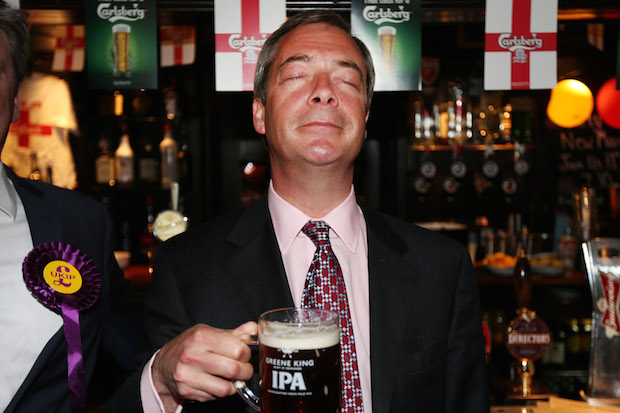I can understand why some of my Conservative colleagues are calling for a pact with Ukip. At varying times over the past few years I have been concerned that our party isn’t doing enough to respond to the electorate’s hunger for an EU referendum, and I agreed that Ukip put necessary pressure on all political parties, and especially on the Conservatives in getting them to commit to a European referendum. However, time has moved on and the Conservative Party—and the country—now has that pledge.
This is a time to hold our individual and collective nerve – and not to make knee-jerk decisions while we’re focussed on today’s results and not the broader political landscape.
The local election results have removed some able and experienced Conservative Councillors. We may lose also some good MEPs, but we should still not do a deal with Ukip. We do not need to do a deal and we certainly do not need or want to be tied by the shackles that such a deal would invariably demand.
Furthermore, a pact with Ukip would hamstring David Cameron in his negotiations with Brussels. He would become a hostage to Ukip’s endless demands, and he would be viewed differently by European leaders if the Conservatives allied themselves with Nigel Farage.
When David Cameron goes to Brussels to negotiate on Britain’s behalf he needs to be diplomatically agile. That means he needs public and private room to manoeuvre. This kind of diplomacy is not Nigel Farage’s natural suit.
Moreover, Ukip’s membership doesn’t want a deal, and neither, it seems from comments by Nigel Farage today, does its leadership. Some of Ukip’s supporters are Labour switchers and Farage doesn’t want to lose them because of a deal with the Tories.
The Conservative Party needs to use the twelve months before the general election to make the philosophical, political and emotional case which will attract Ukip voters back to their Conservative home. David Campbell-Bannerman, the former Deputy Leader of Ukip, is a man who knows about returning to the Tory fold.
We must also continue to deliver on welfare reforms, growing the economy, and most importantly, we need greater definition and clarity on immigration. I suspect a growing economy could also bring a justified tax cutting pre-election budget. Not a giveaway – but a national reward for the country having taken the pain of re-balancing the economy and stopping piling more on its credit card bill.
When I campaigned in the local elections I heard voters mention immigration time and time again, and I saw that the smart British electorate are getting smarter. The conversations I had were about ‘European immigration’ – not non-EU immigration. It’s a policy area where the government has had great success, but the EU migration issue is not going to disappear and will have to be tackled – sooner rather than later.
The Prime Minister needs to keep making the case for what he wants to be reformed in Europe, including the free movement of peoples.
His challenge is that European leaders don’t want to address the issue, as recently stated by Chancellor Merkel during her recent visit to the UK. But if there is a way of, as David Cameron himself has suggested, restricting new EU member states from full freedom of movement of peoples, perhaps until their economies have reached a certain level of GDP per capita, then Brussels could still offer the benefits of Europe to emerging accession countries without existing member states and communities and public services bearing the strain of flows of new EU migrants.
David Cameron should not consider a pact with Ukip. I doubt he is. You don’t cut a deal if you don’t have to cut a deal. The Conservatives are strong enough without a deal. They don’t have to do a deal.
My colleagues should also ask themselves a very important question: can they trust Nigel Farage?






Comments